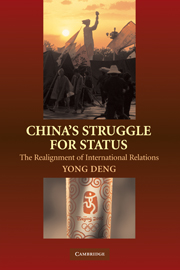Book contents
- Frontmatter
- Contents
- Figure and Tables
- Preface
- 1 Introduction
- 2 International Status and Chinese Foreign Policy
- 3 Negotiating the Human Rights Standard
- 4 Reacting to “China Threat Theories”
- 5 Strategic Partnerships with Russia, the European Union, and India
- 6 Independent Rivalry with Japan
- 7 Rediscovering Asia and Africa: The Multilateral Turn
- 8 Taiwan and China's Rise
- 9 China's Foreign Relations and the Emerging Great-Power Politics
- Index
6 - Independent Rivalry with Japan
Published online by Cambridge University Press: 05 September 2012
- Frontmatter
- Contents
- Figure and Tables
- Preface
- 1 Introduction
- 2 International Status and Chinese Foreign Policy
- 3 Negotiating the Human Rights Standard
- 4 Reacting to “China Threat Theories”
- 5 Strategic Partnerships with Russia, the European Union, and India
- 6 Independent Rivalry with Japan
- 7 Rediscovering Asia and Africa: The Multilateral Turn
- 8 Taiwan and China's Rise
- 9 China's Foreign Relations and the Emerging Great-Power Politics
- Index
Summary
In contrast to the cooperative momentum in China's strategic partnerships with Russia, India, and the EU, Sino-Japanese relations at the outset of the twenty-first century seemed to have evolved in the opposite direction, dipping to a new low under the administration of Prime Minister Junichiro Koizumi. Amidst the competitive dynamics, it's easy to forget that in the aftermath of Tiananmen, Japan became the closest major power for the beleaguered People's Republic of China. A little over ten years later, all the red-button issues – strategic rivalry, territorial conflict, historical animosities, mutually hostile popular nationalism, and Taiwan – flared up at the same time. Yet the already remarkably strong interdependence in terms of economic and social ties has continued to grow. Even during the gloomiest episode of the relationship since 1972, both leaderships were careful to keep the promise of reconciliation alive.
The literature is strong in describing the seemingly paradoxical developments in the Sino-Japanese relationship. Various narratives follow three conventional lines of inquiry, treating the relationship as driven by separate paths of economics and politics, balance of power, and nationalism. But to analytically account for the relationship in its totality, we need to consider the unifying logic behind its seemingly contradictory pattern. To that end, while focusing on the Chinese perspectives, I consider how their respective notions of great-power status affect mutual approaches to the relationship. The competitive impulse is strong because of Japan's dual identity as both a transitional and an established power most vulnerable to the repercussions of China's rise.
- Type
- Chapter
- Information
- China's Struggle for StatusThe Realignment of International Relations, pp. 167 - 199Publisher: Cambridge University PressPrint publication year: 2008



